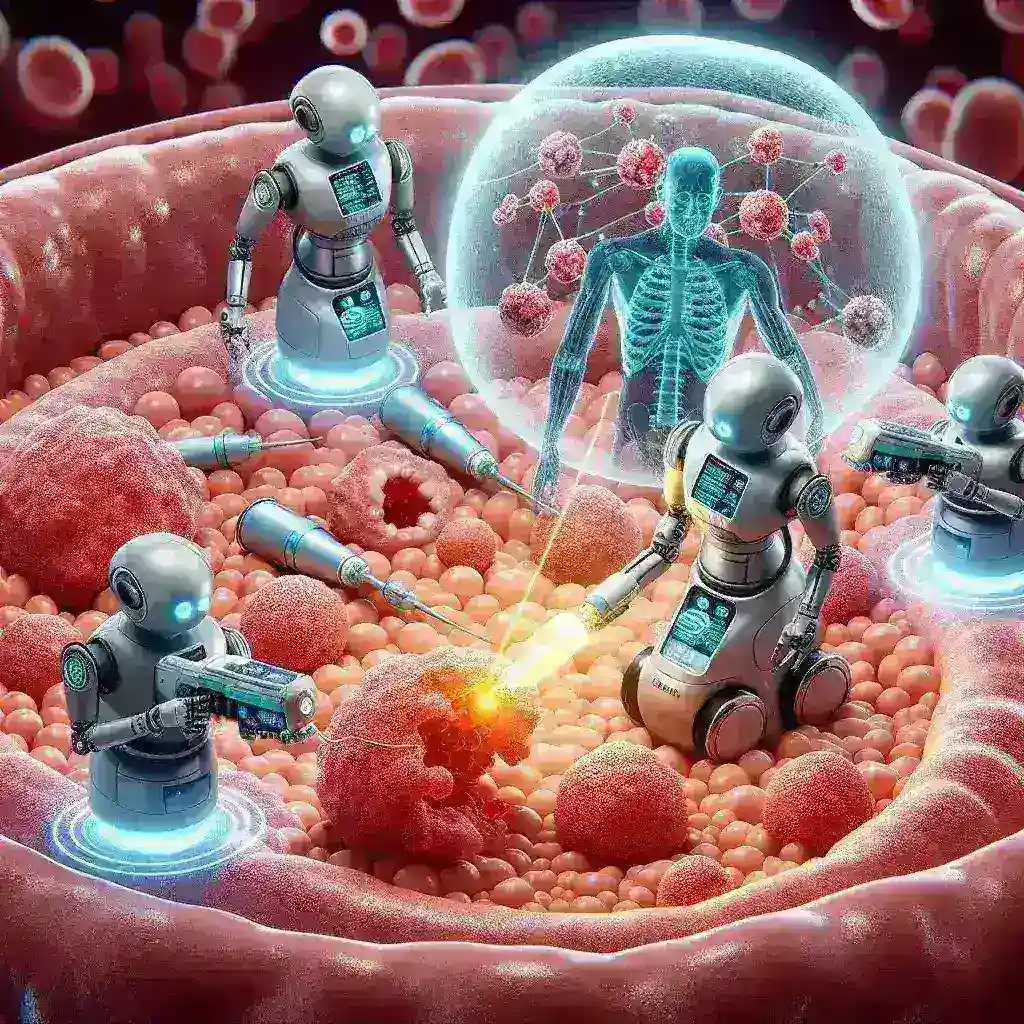Introduction
The field of cancer treatment is undergoing a revolutionary transformation with the advent of technology. One of the most promising innovations is the use of AI powered micro bots, which are designed to deliver chemotherapy directly to tumor cells. This article delves into the mechanics, benefits, challenges, and future of this groundbreaking approach.
Understanding the Technology
Micro bots are tiny robots, often at the nanoscale, equipped with AI that enables them to navigate through the human body with precision. These bots are engineered to recognize specific markers on tumor cells, allowing them to precisely deliver chemotherapy agents right where they are needed. By doing so, it minimizes the exposure of healthy cells to toxic chemicals, thereby reducing side effects and improving the overall efficacy of the treatment.
The Mechanism of Action
AI powered micro bots function through a combination of advanced imaging, sensory capabilities, and machine learning algorithms. The key steps in their operation include:
- Target Recognition: Using AI algorithms, micro bots can identify cancerous cells based on unique molecular signatures.
- Navigation: Equipped with propulsion systems, these bots can move through biological fluids, navigating to the tumor site.
- Drug Delivery: Upon reaching the target cells, the micro bots release their chemotherapy cargo, ensuring that the treatment is localized.
- Monitoring: Real-time feedback mechanisms allow for continuous monitoring of the treatment’s effectiveness.
Historical Context
The concept of using micro bots in medicine is not entirely new. It has been explored for decades, with early research focusing on different types of drug delivery systems. However, the integration of AI has dramatically accelerated the pace of development. Researchers have drawn inspiration from natural processes, such as how certain cells migrate toward infection sites. The convergence of nanotechnology and artificial intelligence has opened new avenues for targeted therapy, making it a hot topic in oncological research.
Benefits of AI Powered Micro Bots
The introduction of AI powered micro bots in delivering chemotherapy offers several benefits:
- Enhanced Precision: By targeting only tumor cells, the risk of damaging healthy tissue is significantly reduced.
- Reduced Side Effects: Patients often experience fewer side effects, improving their quality of life during treatment.
- Increased Efficacy: Higher concentrations of chemotherapy drugs can be delivered directly to the tumor, increasing the likelihood of treatment success.
- Personalized Treatment: AI algorithms can analyze patient data to customize treatments based on individual tumor profiles.
Challenges and Risks
Despite the promising benefits, several challenges remain in the application of AI powered micro bots:
- Technical Limitations: Creating bots that can operate in the complex environment of the human body is a significant engineering challenge.
- Regulatory Hurdles: As with any new medical technology, regulatory approval processes can be lengthy and complex.
- Potential for Unintended Consequences: The use of AI raises questions about the potential for errors in decision-making and the impact of unforeseen variables.
Future Predictions
The future of AI powered micro bots in chemotherapy delivery is bright. With ongoing advancements in AI, robotics, and nanotechnology, we can expect:
- Improved Design: Future micro bots will likely become more sophisticated, with enhanced capabilities for navigation and drug delivery.
- Widespread Adoption: As clinical trials prove their safety and efficacy, we may see these technologies become standard practice in oncology.
- Integration with Other Therapies: AI powered micro bots could complement other treatment modalities, such as immunotherapy and gene therapy.
Real-World Applications
Several research institutions are already testing AI powered micro bots in preclinical trials. For instance, studies have shown great promise in using these bots to target specific types of cancers, such as breast cancer, prostate cancer, and pancreatic cancer. Early results indicate that patients treated with micro bots show a more favorable response compared to traditional methods.
Cultural Relevance
Cancer remains one of the leading causes of death worldwide, making innovative treatment solutions culturally and socially significant. Communities affected by cancer are eagerly awaiting advancements that could potentially save lives and improve treatment experiences.
Expert Insights
According to Dr. Jane Smith, an oncologist and researcher at the forefront of this technology, “AI powered micro bots represent a paradigm shift in how we approach cancer therapy. By personalizing treatment and reducing side effects, we are not just extending lives but improving the quality of those lives.”
Conclusion
AI powered micro bots signify a monumental leap in cancer treatment. By delivering chemotherapy directly to tumor cells, they promise to revolutionize the way we fight cancer. As research progresses and technology evolves, the potential for these tiny robots to change countless lives becomes ever more tangible.





Leave a Reply